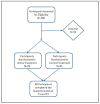Beneficial Effects of Limosilactobacillus reuteri PBS072 and Bifidobacterium breve BB077 on Mood Imbalance, Self-Confidence, and Breastfeeding in Women during the First Trimester Postpartum
- PMID: 37630704
- PMCID: PMC10458832
- DOI: 10.3390/nu15163513
Beneficial Effects of Limosilactobacillus reuteri PBS072 and Bifidobacterium breve BB077 on Mood Imbalance, Self-Confidence, and Breastfeeding in Women during the First Trimester Postpartum
Abstract
Background: The post-delivery period could be characterized by psychological distress (e.g., anxiety, sadness, and irritability), leading to postpartum depression (PPD). Objective: The present clinical study assesses the effect of probiotic supplementation containing Limosilactobacillus reuteri PBS072 and Bifidobacterium breve BB077 (4 × 109 CFU/day) on the mother's mood and breastfeeding quality during the first trimester after delivery. Methods: A Randomized, Double-Blind, Controlled (RDBPC) trial was carried out on 200 healthy new mothers divided into an active group taking a supplement containing Limosilactobacillus reuteri PBS072 and Bifidobacterium breve BB077 (4 × 109 CFU/day) plus multivitamins and a control group (multivitamin complex only) for 90 days. Symptoms related to maternal depression and breastfeeding quality were evaluated at days 45 and 90 using the Edinburgh Postnatal Depression Scale (EPDS) and the Breastfeeding Self-Efficacy Scale-Short Form (BSES-SF). Results: At days 45 and 90, the probiotic treatment significantly ameliorated the mothers' mood compared to the control treatment (p < 0.001). Likewise, the breastfeeding quality and the baby's cries significantly improved in the probiotic group (p < 0.001). Conclusions: Microbiota alterations could influence a post-delivery woman's mental state. According to our results, L. reuteri PBS072 and B. breve BB077 are potential candidates that are able to improve stress resilience in the postpartum period.
Keywords: Bifidobacterium breve BB077; Limosilactobacillus reuteri PBS072; breastfeeding; delivery; depression; gut–brain axis; postpartum; probiotics.
Conflict of interest statement
Patrizia Malfa is a Synbalance srl employee. She had no role in the design of this study; the collection, analyses or interpretation of data; she contributed to the writing of this manuscript.
Figures





References
-
- Abdollahi F., Rezai Abhari F., Zarghami M. Post-Partum Depression Effect on Child Health and Development. Acta Med. Iran. 2017;55:109–114. - PubMed
-
- Guintivano J., Sullivan P.F., Stuebe A.M., Penders T., Thorp J., Rubinow D.R., Meltzer-Brody S. Adverse life events, psychiatric history, and biological predictors of postpartum depression in an ethnically diverse sample of postpartum women. Psychol. Med. 2018;48:1190–1200. doi: 10.1017/S0033291717002641. - DOI - PMC - PubMed
-
- Mughal S., Azhar Y., Siddiqui W. StatPearls [Internet] Volume 7 StatPearls Publishing; Treasure Island, FL, USA: 2022. Postpartum Depression.
Publication types
MeSH terms
LinkOut - more resources
Full Text Sources
Other Literature Sources

